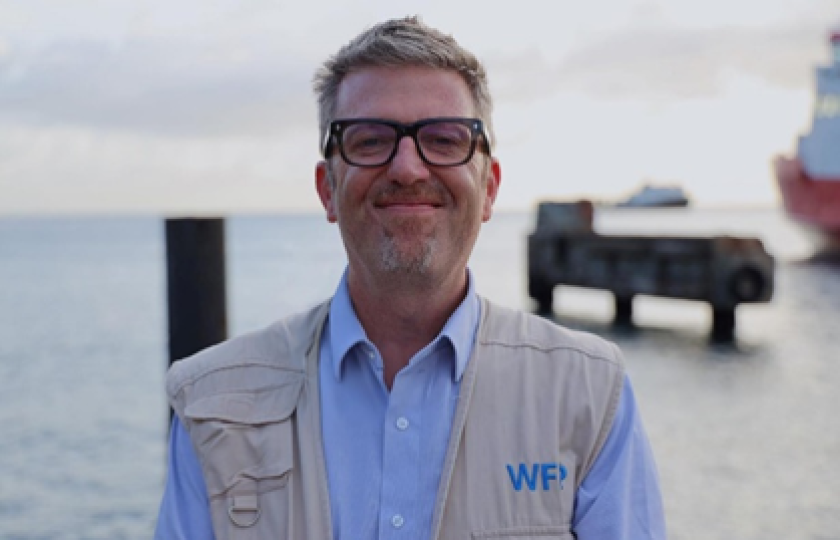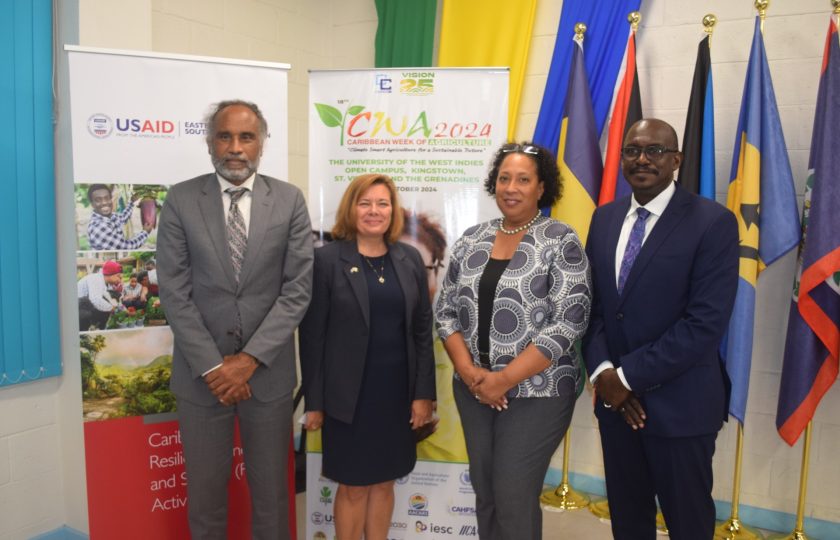Kingstown, St. Vincent and the Grenadines, 7 October 2024
All protocols observed
Good morning.
The Caribbean Agricultural Research and Development Institute (CARDI) is pleased to
participate in this 18th Caribbean Week of Agriculture, hosted right here in the scenic
breadbasket of the Southern Caribbean – St Vincent and the Grenadines.
The theme ‘Climate Smart Agriculture for a Sustainable Future’ is indeed relevant to the
Regional context as climate change remains one of our most significant developmental
challenges. Over the last nine months we have all experienced the effects from extreme heat
spells, prolonged droughts and water shortages to intense rainfall and floods – all
destabilizing our food systems and disrupting production, access and availability. When these
things happen, it is the rural communities, small holder farmers, and the poor that are hardest
hit. It was only on 1st July that Hurricane Beryl made land fall right here in St Vincent and the
Grenadines as a Category 4 storm leaving a trail of damage and destruction, particularly on
Union Island before continuing on to other territories. Grenada, Carriacau and Petit
Martinique, Jamaica, and the Cayman Islands, all affected. Preliminary loss and damage
estimates for the agriculture sector across all impacted islands have been estimated in the
vicinity of US $159 million. A significant loss for a Region that is working to reduce its 6 billion
USD annual food import bill. The total cost is significantly more.
Just prior to this, President Irfaan Ali at the Heads of Government meeting in Grenada gave
a positive outlook reporting that in the first quarter of 2024, CARICOM Member States had
recorded a 30% achievement of targets set and a 12% decline in real imports, equal to a
quarter of a billion dollars. But this is what climate extremes can do – it can derail the
achievement of our goals and targets in the blink of an eye.
2
We are well aware of the realities of climate change in the Region. The promotion and
adoption of Climate Smart Agriculture is crucial to addressing the chronic low production and
productivity, building resilience and reducing emissions, however little it may be. We need to
pivot now and really climate proof our agriculture sector.
For us at CARDI, Building Climate Resilience in Agriculture has been part of our research
agenda for more than a decade. We have promoted the use of protected structures across
the Region, advanced germplasm conservation and management as a strategy to improving
production, soil and water management and conservation as well as the development,
promotion and adoption of integrated pest management strategies.
While we would have made measured progress with these initiatives, their expansion have
been stymied by underinvestment in agricultural research and development. And when I
speak about underinvestment, I mean by both private and public sectors. And while we
encourage private sector investment, it is not meant to be a substitute for public sector
investment, but meant to be complementary.
Permit me to cite a few lines out of a research paper from the International Food Policy
Research Institute, published in 2023, entitled “Innovation capacity, food system
development and the size of the agricultural research system”.
In its introduction, the paper notes that “there is considerable evidence that investing in
agricultural research is a highly effective pathway for both reducing poverty and hunger and
addressing climate change impacts on food systems (Rosegrant et al., 2017; Mason-D’Croz et
al., 2019; Agricultural Science and Technology Indicators, 2022)”. It goes on to say that
“regardless of the mode of investments, timeframe, and specific targets for adaptation
chosen, studies have consistently shown that spending on agricultural research has had a
greater impact on agricultural productivity than other types of public expenditures”. It
continues even further……..”Agricultural research spending has also performed best or
second-best in reducing poverty, whether the comparison is with other investments, such as
irrigation, soil conservation, and farm subsidies, or with investments in other rural areas, such
as health, education, and roads (Diaz-Bonilla et al., 2014; Mogues, 2015)”.
The data is out there to support the case for increased R and D public sector funding. Why
then do we spend so little on it?
Besides this, we need to also scale up innovative solutions and implement large scale projects
that will have the transformative impact needed to drive socio economic growth and
economic resilience.
While greater investments in adaptive research is crucial for developing climate smart
agriculture solutions and boosting productivity and safeguarding the livelihoods of our
producers. Equally important is the need to improve access to climate financing for our
farmers, especially the smallholders. This will enable them to better cope with shocks and
stresses and support more productive, resilient food systems.
3
During the week we’ll be highlighting the results and impacts of our work in promoting and
managing diverse and tolerant germplasm, the use of digital tools and alternative energy as
scalable climate smart strategies. We will also convene a session on “Food and Nutrition
Security Contributions and Initiatives 2025 and Beyond as well as host our 37th Board of
Governors Meeting.
I take the opportunity to invite you to our booth at the Trade Show and Exhibition, where
you’ll learn more about our work in St Vincent and the Grenadines and across the wider
Caribbean. We look forward to meeting and sharing our experiences, networking and
strengthening our partnerships.
This week, our collective goal is to develop and promote the adoption of climate smart
agriculture solutions and sustainable practices to build resilience. For us to achieve that,
partnerships, policies and investments are needed to ensure we can feed the projected
CARICOM population of 22 million by 2050, and this is projected to be under a harsher
climate. The time is now, to align our rhetoric with action – and collective action that is, as
we all know, we do more together.
We at CARDI take the opportunity to thank the people and Government of St Vincent and the
Grenadines for being a most gracious host and the members of the various planning
committees for bringing this week to life. The results of your hard work is clear and
appreciated.
To all participants have a successful and enriching CWA 2024!


